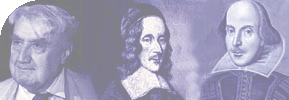While you check Goethe’s Erlkönig for clues, there are some points of interest to discuss. The first is the presence of an external narrator. A woman who tells a story in which she is not personally involved. And that in consequence is told from an outsider’s point of view. We haven’t seen that before. And because a poem in this class does not contain a syllable more than necessary, her two stanzas make her a vital part of her own words.
The more because Dorchen leaves seven syllables out, that feature in the 1815 Schubert song, which took its text from the newly published Goethe-edition. This difference accounts for seven of eight ‘e’s between brackets. The one from the printed editions that is ignored by both Schröter and Schubert, is the one in ‘düster(en) Ort’. This one happens to devide the text roughly on its golden section in both numbers of words (‘Vater’) and numbers of lines (‘wiegen und tanzen’). This golden section line is placed exactly on the golden section of the eight deleted ‘e’s. And if deleted itself, it rather amazingly places ‘Vater’ on the golden section between soll(en) and düster(en) as well. From which follows that the actual golden section of this sequence is on ‘singen’. Which makes sense in a ballad.
We therefore have to take into account that Dorchen lives in a society where elves are as real as country life. As a result her opening line is not quite the neutral observation that it seems to be : what fool dares to brave the wild by night? A question of which the immediate answer spells disaster even before the story gets on its way : if the realm of elves is by night no place for adults, it is certainly no place for children. The second couplet of the opening stanza indeed points at some clear and present danger. As it should, because the night is a metaphor of death. Late autumn is another strong metaphor along the same line, because it announces the end to be near. A message that Goethe’s ballad audibly communicates in the gale induced whispers of fallen leaves. Meaning that the son’s fate is sealed by the time Dorchen has got halfway her narrative.
Unavoidable fate is a basic feature of classical tragedy. And when combined with dialogue, classical tragedy is staged as classical drama.
Classical tragedy traditionally is a story of a hero (or heroine) who experiences a reversal of fortune set in motion by the gods as a result of hubris.
We therefore check for the three unities, while checking for hero, hubris, and the hero’s classification.
Hubris is excess of self-esteem. Pride in most cases, but this time self-confidence is more likely.
Icarus class : the hero(ine) whose hubris brings him-/herself down .
Daedalus class : the hero(ine) whose hubris brings somebody else down.
And in consequence decide that this ballad has by definition to end with a non-metaphorical demise. This, of course, does not allow the presence of ‘Oh’s, but, on the other hand, the presence of supernatural beings is now recognized as obligate to provide for some punishing force to bring death. And when night and nature conspire to lay the boy low together, night’s and nature’s hidden people (i.e. elves) have their part to play. The boy therefore can’t be hallucinating. In consequence the ballad has to rule out that he does, if only to tell a consistent story. When it comes to that, Goethe is a craftsman who may cleverly suggest a fever in order to keep things ambiguous, but who never uses this fever to explain the Appearance away. Rather to the contrary, as those amongst you who did not skip the basic wordsubstitution, must have noticed. Like you must have noticed the perfect playing with rhythm, and the equally perfect positioning of dialogue lines.
No, this does not mean that the rhythm itself is perfect. The setting by Loewe, for instance, moves at one point audibly out of step. And in order to preserve balance Dorchen has to adjust :
Der Vater dem grauset’s, er reitet geschwind,
Er hält in den Armen das ächzend’ Kind.Confronted with the same problem, Schubert corrects Goethe’s slip-up by a later, and better considered, reaction :
Dem Vater grauset’s, er reitet geschwind,
Er hält in Armen das ächzende Kind.
If you have noticed the anomaly as well, you even may decide that the ballad’s context as a prelude to Dorchen’s scheme proves significant after all. And elves are indeed rather ambiguous in the threat they constitute to mortals.
Thanks to Goethe’s clever wordplay, the ballad apparently features a boy who is not exactly in danger of life. Yet, the same boy falls at the same time victim to a classical tragedy. Which definitely rules out physical survival. The result of this survey may therefore be perceived as somewhat confusing. Yet, this is what an author refers to when talking about ‘writing in layers’ : the art of telling different stories by a single text. We already have noticed the feature in Come away, Death and Let down the Bars. Which makes a score of three out of four poems that are linked by the word ‘death’. When it comes to writing in layers, this looks like a random selection. And seems to indicate a fairly common practise. The more because Dido’s lament, as the exception, is rather suggestive as well on the exact nature of her dying scene. At which observation the five discussed samples of poetry have prepared you sufficiently to deal with the nemesis of literary criticism :
—
the turn of the screw
this link will be placed in the near future
